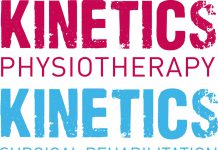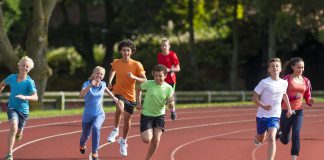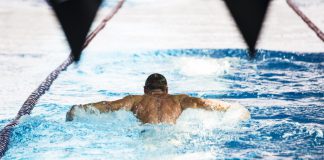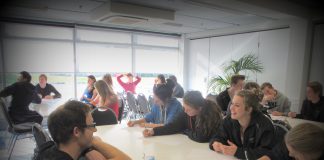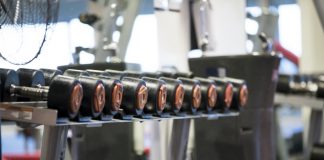North Shore swimmer, Paralympian and AUT Millennium Scholarship Athlete.
The AUT Millennium concourse is a bustling, noisy place to be on Friday 20 July. It’s the first day of the annual ‘Jelly Belly’ U12 Water Polo tournament and there’s no shortage of excitement. Swarms of kids roll through the door, some are already in their togs, dressed and ready for the three day event. Rebecca Dubber, better known as Becs, has managed to find a spare table in the hustle and bustle of children, coaches and parents. Her training bag is nestled against the chair, packed with the necessities of an athlete’s life. Becs is a swimmer and Rio Paralympic bronze medallist. She looks comfortable waiting alone, an air of confidence emanates from the 25 year-old. It’s not surprising that Becs is so relaxed, the place has been her second home since 2005. The backstroke specialist has enjoyed a number of career highs since she started swimming competitively at age 10. It’s hard not to look past the 2016 Rio Paralympic Games, where Becs surged to the finish in the 100m backstroke to take bronze and prevent a clean sweep by the Chinese swim team. The path to international success hasn’t been easy, however. Sipping on a small flat white outside Little French Café, Becs opens up about ongoing injury, the slow road back to recovery and learning to balance a demanding schedule of training, studies and work.
“It’s a very slow progression, I won’t be back to full training until the end of the year and I won’t race until 2019.” Becs tells of her comeback following a second elbow surgery in March 2018. “After five months the most I’m doing in the pool is 1,500m, which is the same distance as most swimmers warm up,” she laughs. Elbow troubles have haunted the swimmer since 2013, where a simple move to collect an item off the floor left her in unbelievable pain. “I had elbow overuse,” she explains, “It got painful for a long time and it still wasn’t getting better. We tried de-loading my programme until I almost wasn’t training at all.” Initial assessments suggested osteoarthritis could be the reason behind ongoing issues, but Becs wasn’t convinced. Following additional trips to specialists, she was diagnosed with Osteochondritis dissecans (known as OCD or OD). The disorder affects joint mobility and results in pain and locking.
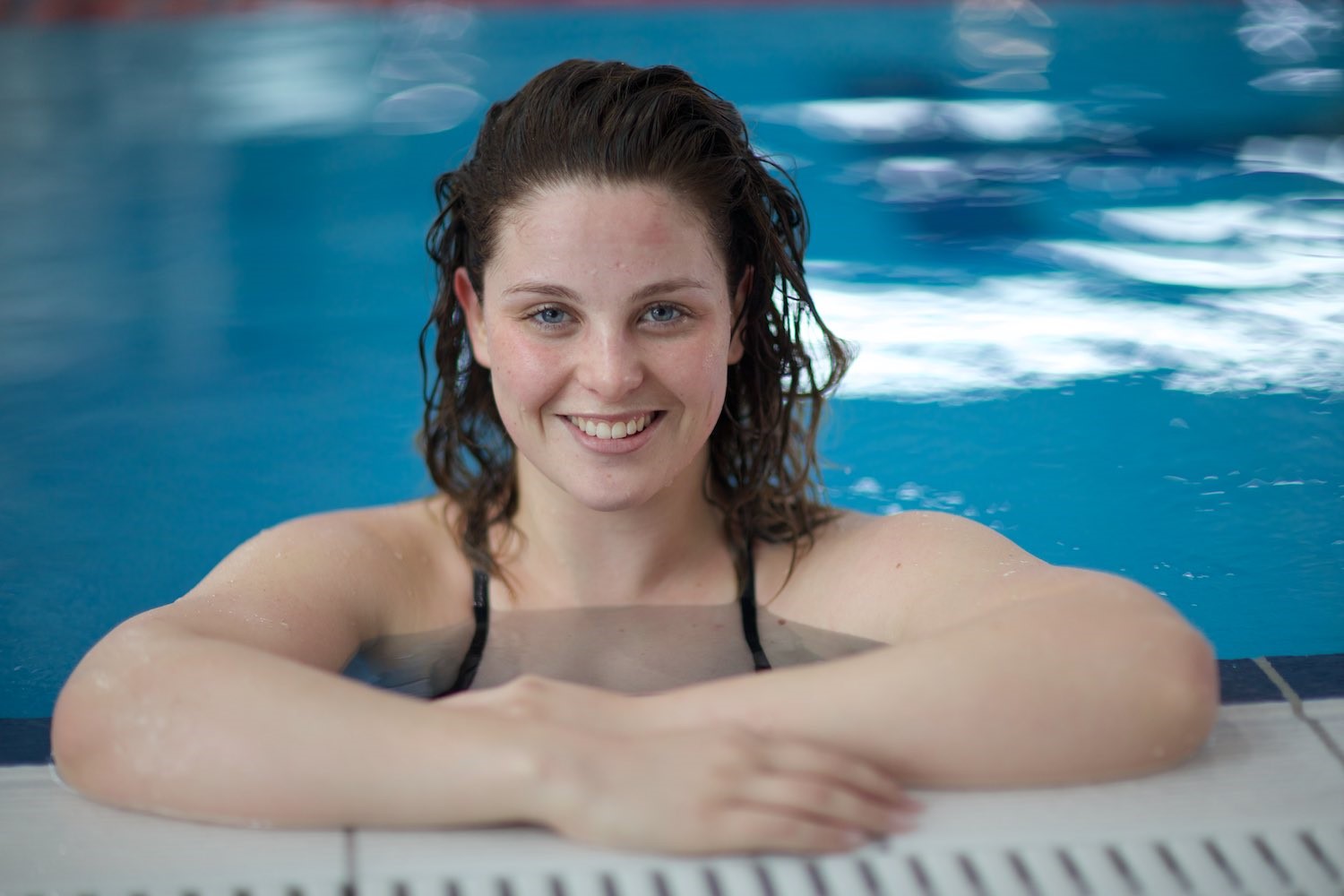 Becs smiles as she explains that a proper diagnosis was a blessing in disguise. “There was a lot of uncertainty before I got the diagnosis, I almost thought I was going to have to give up the sport I loved, but once my surgeon told me what he was going to so it set out a clear path towards tokyo. It wasn’t hard because I could see where we were going, but it was frustrating because everything happens so slowly,” she muses. The weeks and months following the operation were not without complications. Small setbacks and the realities of rehabilitation continued to test Bec’s commitment to the sport. “The first time I tried bench press after the surgery went well in the gym, but when I woke up in the morning my elbow was in shock. I couldn’t complete the next session and I was in a lot of pain.” she recalls. Her face warms as she describes how supportive her team is. “They didn’t let me get down, they just repeated that we’d adapt and adjust to get back on track.” The long road to recovery has reshaped the way Becs’ interprets success. While medals and times were once a predictor of success, the athlete has learned to find satisfaction in different ways. “I’m looking forward to smaller milestones. Doing an extra 100m every week. I get excited about things to work towards as a posed to competition. I’m relishing the opportunity to take a backseat this year.”
Becs smiles as she explains that a proper diagnosis was a blessing in disguise. “There was a lot of uncertainty before I got the diagnosis, I almost thought I was going to have to give up the sport I loved, but once my surgeon told me what he was going to so it set out a clear path towards tokyo. It wasn’t hard because I could see where we were going, but it was frustrating because everything happens so slowly,” she muses. The weeks and months following the operation were not without complications. Small setbacks and the realities of rehabilitation continued to test Bec’s commitment to the sport. “The first time I tried bench press after the surgery went well in the gym, but when I woke up in the morning my elbow was in shock. I couldn’t complete the next session and I was in a lot of pain.” she recalls. Her face warms as she describes how supportive her team is. “They didn’t let me get down, they just repeated that we’d adapt and adjust to get back on track.” The long road to recovery has reshaped the way Becs’ interprets success. While medals and times were once a predictor of success, the athlete has learned to find satisfaction in different ways. “I’m looking forward to smaller milestones. Doing an extra 100m every week. I get excited about things to work towards as a posed to competition. I’m relishing the opportunity to take a backseat this year.”
Swimming isn’t the only thing in Becs’ life, of course. Balancing her studies at AUT University and working at the Halberg Foundation ensures that there’s never a dull moment. Picking up a book or sitting down with her partner to watch an episode of Brooklyn nine-nine are go-to stress-relievers. “We actually watched the entire five seasons in under a month!” confesses Becs. “When it’s cold and we’ve finished a hard week of work it’s nice to wrap up and get into the show.” The start of a new week leaves no time for Netfliz however. With a long journey back to full fitness and the Tokyo Paralympics approaching, Becs is aware that she needs to treat this next phase with patience and precision. “One day at a time and celebrating small change is important”, she says.

























